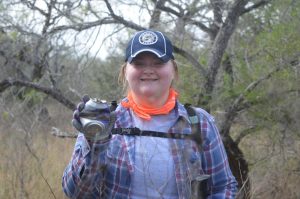
Lilly Bucher
- Expert Role: Field Expert
- Major: Human Biology
- Class: Graduate Student
- Hometown: St. Louis, Missouri
Why is this humanitarian work important to you?
The rhetoric that surrounds the Texas-Mexico border was overwhelmingly negative in my local news and school growing up. The situation is incredibly complex politically, socially, and culturally and because of the oversimplification that is still pushed, people tend to forget that these individuals are human beings who deserve our care and respect. I am privileged enough to know that myself, my family, and my friends are safe and that we have everything we need, but these individuals do not have that luxury. This work is important to me because if somebody that I loved was in the position that migrants crossing the border are, there is nothing I would want more than to know that somebody cared enough to look for them and was trying to return them to me.
What do you hope to gain from this experience?
While it would be impossible to ever truly grasp what individuals in this situation are feeling and experiencing without facing it personally, I am hoping that this opportunity will provide a deeper insight into what they are facing. Learning about cultures other than my own is also incredibly important to me, so I hope to learn more about the people of Falfurrias, Texas as well.
I want to pursue a career in humanitarian work as a forensic anthropologist and I believe that this experience will better prepare me to understand the various stresses that would be present and to advocate for individuals affected by trauma.
What are some of the biggest challenges you will face while in Texas?
While I hope to understand the migrants’ experience crossing the border in more depth, the biggest challenge I believe I will encounter in Texas are the harsh realities surrounding it. It will also be a challenge to realize my own preconceived notions, come to terms with them, and to educate myself about the unbiased truth. The physical stresses of this work will also be a different experience for me as I am not used to this specific environment.
What’s one thing people probably don’t know about you until they’ve known you a long time?
I am a collector! If there is something that can be collected, I will probably find it. Currently, I collect mugs, records, books, crystals, DVDs, picture frames, and blankets.
When did you know you wanted to pursue human biology as a degree, and how did you become interested in forensics?
I became interested in forensics when I was in high school when I was introduced to a career in crime scene investigation. I loved forensic science but discovered that I was unwilling to give up my interests in history and the human condition. Forensic anthropology was the best combination of my academic interests and dedication to learning more about the lived experiences and cultures of those the same and different than me. Because of my intention to study forensic anthropology, I earned a B.S. in Anthropology, and I was focused on master’s programs that offered programs in anthropology. This degree took me by surprise as I was not anticipating it aligning with my interests because I thought it was strictly hard sciences. After more research, I found that what the professors who make up this program aimed to provide to the field of forensic anthropology was in line with what I wanted to do. I have experience in anthropology and archaeology, so it was important to me to gain more knowledge in anatomy and forensics while being supplemented with anthropological ideas.
What advice would you give other students interested in pursing a human biology degree at UIndy?
Don’t be afraid to ask questions! The professors and current students want to talk and to help you. The more you know about a program the better prepared you will be going in. Do not be afraid to try things and get involved in your undergraduate, the more you try the more you can narrow down what motivates you. This is a science focused degree so having a scientific background would be helpful, but if you come from a physical anthropological or bioarchaeological background, do not be afraid to apply if the degree aligns with your goals. Communication with the professors is key!
What makes UIndy’s human biology program distinctive?
There is no other program to my knowledge that offers the level of involvement in case work for all graduate students that UIndy does. Outside of class, there is an incredible amount of experiential learning occurring, and learning happens not only from professor to student but from student to student as well. The students in and coming into this program come from a huge variety of academic backgrounds. Because of this, different perspectives are brought into our conversations that contribute to a deeper understanding of our field and the world around us.